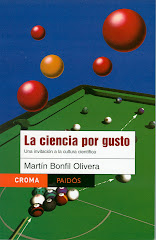by Martín Bonfil Olivera
Published on Milenio Diario, October 8, 2008
 There are people who live to finger-point the mistakes and failures of science. A recurrent example is AIDS: it is said that the efforts of the thousands of scientists during more than two decades have not been enough to fight it.
There are people who live to finger-point the mistakes and failures of science. A recurrent example is AIDS: it is said that the efforts of the thousands of scientists during more than two decades have not been enough to fight it.
The announcement of the Nobel prize of physiology and medicine last Monday, given jointly to the discoverers of the HIV and the varieties of human papillomavirus (HPV) that cause cervical cancer debunks such ideas. Bio-medical science has demonstrated its power by detecting the causal agents of two of the gravest evils of our time.
AIDS emerged in public sight in 1981. By 1984, French researchers Luc Montagnier and Françoise Barré-Sinoussi, had already identified the cause agent. They supposed it could be a retrovirus -a virus with an RNA (ribonucleic acid) genome, instead of the most common molecule of DNA- and searched evidence of its presence; they detected it in the cells of AIDS patients. As mentioned by the Nobel committee, "never before have science and medicine been so quick to discover, identify the origin and provide a treatment for a new disease."
This made it possible to study the virus in more detail. Its genome was cloned and sequenced, every molecule that forms the virus was analyzed, and today the processes that lead the infection and death are much better understand. As a consequence, preventive methods and treatments to combat the pandemic have been developed. And if Montagnier is right, perhaps in less than five years we may have an efficient therapeutic vaccine that can help infected people.
On the other hand, German researcher Harald zur Hausen needed 10 years of detailed work to prove that another virus, the papillomavirus or HPV, is the cause of cervical cancer, the second most common in women. Finally, he identified, among the more than 100 known species, two guilty viruses (VP 16 and 18), and today we have detection tests and vaccines that offer an efficient protection against them.
Without any scientific knowledge, today we would be vulnerable to these and other diseases. Nobel awards reward, although a little bit late, discoveries that without a doubt have contributed to a greater welfare to humanity.
(translated by Adrián Robles Benavides)
To receive Science for pleasure weekly
in your email, subscribe here!




No comments:
Post a Comment